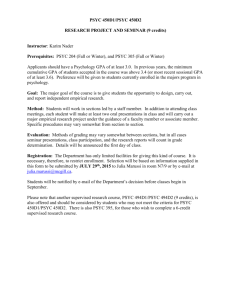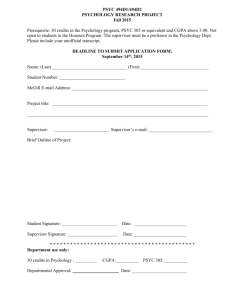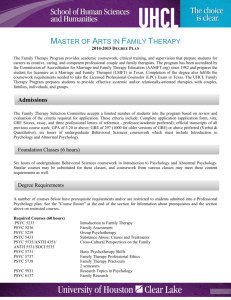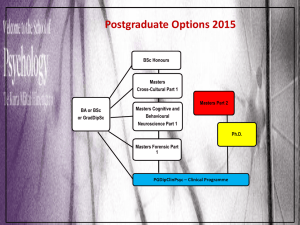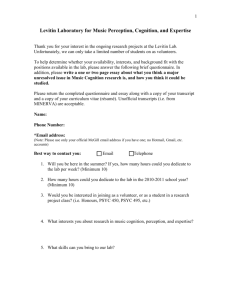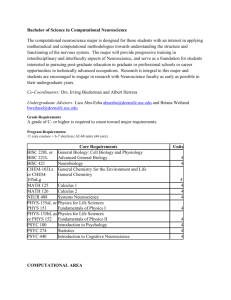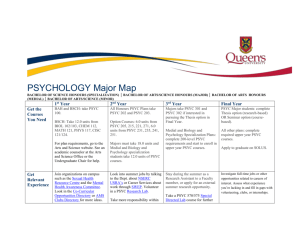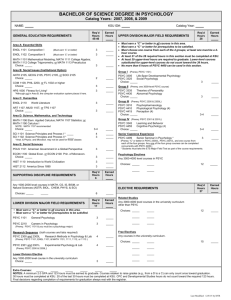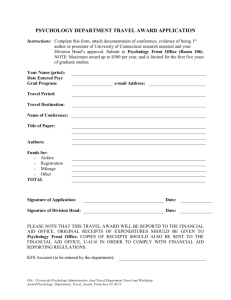here - GSSSH
advertisement
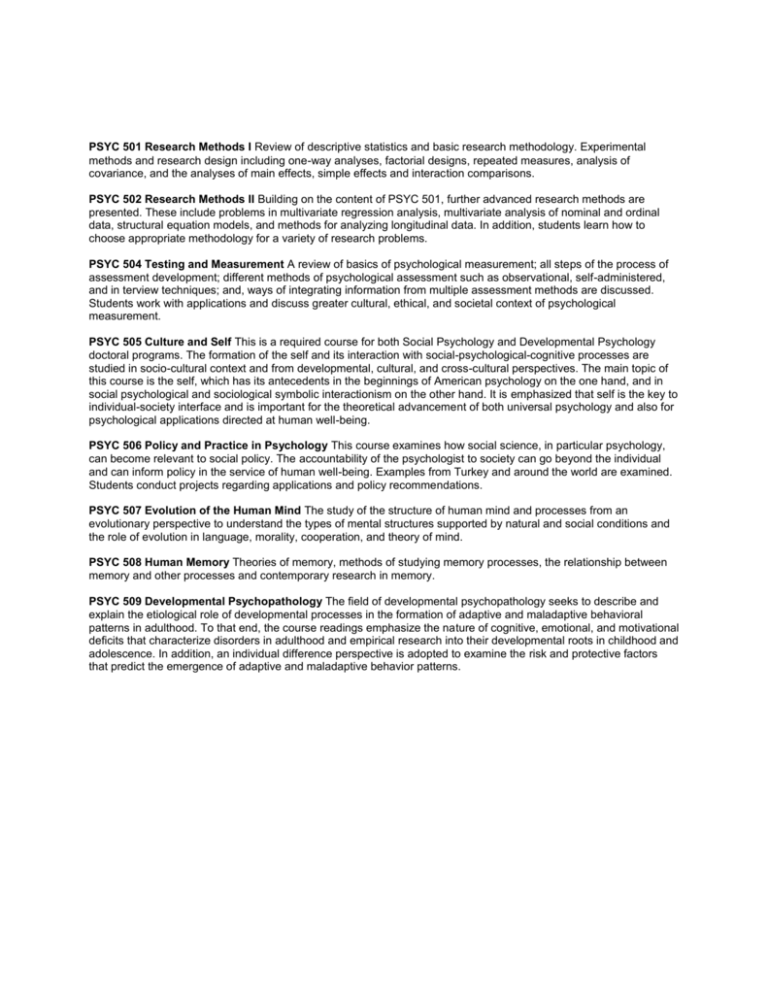
PSYC 501 Research Methods I Review of descriptive statistics and basic research methodology. Experimental methods and research design including one-way analyses, factorial designs, repeated measures, analysis of covariance, and the analyses of main effects, simple effects and interaction comparisons. PSYC 502 Research Methods II Building on the content of PSYC 501, further advanced research methods are presented. These include problems in multivariate regression analysis, multivariate analysis of nominal and ordinal data, structural equation models, and methods for analyzing longitudinal data. In addition, students learn how to choose appropriate methodology for a variety of research problems. PSYC 504 Testing and Measurement A review of basics of psychological measurement; all steps of the process of assessment development; different methods of psychological assessment such as observational, self-administered, and in terview techniques; and, ways of integrating information from multiple assessment methods are discussed. Students work with applications and discuss greater cultural, ethical, and societal context of psychological measurement. PSYC 505 Culture and Self This is a required course for both Social Psychology and Developmental Psychology doctoral programs. The formation of the self and its interaction with social-psychological-cognitive processes are studied in socio-cultural context and from developmental, cultural, and cross-cultural perspectives. The main topic of this course is the self, which has its antecedents in the beginnings of American psychology on the one hand, and in social psychological and sociological symbolic interactionism on the other hand. It is emphasized that self is the key to individual-society interface and is important for the theoretical advancement of both universal psychology and also for psychological applications directed at human well-being. PSYC 506 Policy and Practice in Psychology This course examines how social science, in particular psychology, can become relevant to social policy. The accountability of the psychologist to society can go beyond the individual and can inform policy in the service of human well-being. Examples from Turkey and around the world are examined. Students conduct projects regarding applications and policy recommendations. PSYC 507 Evolution of the Human Mind The study of the structure of human mind and processes from an evolutionary perspective to understand the types of mental structures supported by natural and social conditions and the role of evolution in language, morality, cooperation, and theory of mind. PSYC 508 Human Memory Theories of memory, methods of studying memory processes, the relationship between memory and other processes and contemporary research in memory. PSYC 509 Developmental Psychopathology The field of developmental psychopathology seeks to describe and explain the etiological role of developmental processes in the formation of adaptive and maladaptive behavioral patterns in adulthood. To that end, the course readings emphasize the nature of cognitive, emotional, and motivational deficits that characterize disorders in adulthood and empirical research into their developmental roots in childhood and adolescence. In addition, an individual difference perspective is adopted to examine the risk and protective factors that predict the emergence of adaptive and maladaptive behavior patterns. PSYC 510 Emotion and Motivation The course provides an overview of theories and research in emotion and motivation. Readings will examine the role of emotions and motivations in verbal & nonverbal communication, decision-making and reasoning, social functioning, and psychopathology. Whenever possible, students will be exposed to these topics at different levels of analysis including biological, cognitive, and social. PSYC 512 Language Development: Theories and applications Theoretical and measurement approaches to language development from infancy to school-age; language comprehension and production skills, narrative competence, role of environmental factors in the emergence and the development of language. PSYC 513 Organizational Behaviour Analyzes behavior in organizations and work groups. Specifically focuses on review of recent literature on issues such as leadership, teamwork, organizational communication, motivation, and organizational change and development. PSYC 517 Advanced Industrial and Organizational Psychology The course will focus on state-of-the-art theoretical and methodological approaches in IO Psychology. Most recent research and theories on some of the most important subjects of the field like “criteria definition”, scientific bases of personnel decisions and industrial development will be discussed. Also in order to encourage students to have research experience in these areas, they will be asked to conduct a research project. PSYC 518 Human Resource Management The course focuses on the most recent developments in science and practice of Human Resource Management (HRM) in key areas, including strategic role of HRM, human resource planning, staffing, performance appraisal and management, compensation and reward management, career management, training and development, and union-management relationships. PSYC 520 Attitudes, Persuasion and Social Influence This course will provide an overview of classic and recent research on attitudes and persuasion. Content will include broad coverage of the issues of major importance to attitude theory, but will focus on more recent issues and controversies that have captured the interest of researchers in the field. The class will cover topics such as structure and functions of attitudes, measurement, the role of memory, models of attitude chaneg and persuasion, resistance, message design and evaluation. Students who take this course will become familiar with research methods and major issues in attitudes research and will have a better understanding of how individuals form, use, and maintain their evaluations. Throughout the course, students will be encouraged to critique existing research and formulate new research ideas. Applications in the context of health, consumption, politics, and advertising will be covered throughout. PSYC 521 Cognitive development Theoretical and measurement approaches to children’s understanding of the physical and the mental world; assessment of intellectual development, language competence and communicative skills. PSYC 523 Psychology of Close Relationships Course readings and discussion will focus on theoretical and empirical work on the formation, maintenance and dissolution of close relationships. Readings will emphasize the role of cognitive factors, e.g. attributions, and emotional factors on interpersonal communication in the context of close relationships and they will cover marital relationships, friendships, parent-child, and family relationships. A portion of the readings will emphasize the social and policy implications of this research for issues such as divorce and family violence. PSYC 524 Social Development This course will examine the social aspects of development. Topics include parenting, peer relationships and friendship, attachment, empathy, aggression, emotional development, gender socialization, and adult social development. PSYC 525 Applied Developmental Psychology This course will help develop the students? understanding of how the science of human development may contribute to address individual, familial, social, political, and economic problems. This course will address how human potential can be realized at an individual level and how societal resources can be created, mobilized, and utilized to facilitate the realization of human potential. PSYC 526 Cognitive Models and Theories History of cognitive psychology, models and theories about basic cognitive processes and the relationship of these theoretical approaches to attention, memory, knowledge representation, information processing, and problem solving, different approaches and methods to conceptualization of human mind. PSYC 527/PSYC 427 Conditioning and Learning A detailed study of major theories in the area of conditioning and learning. Topics include habituation, sensitization, classical conditioning, instrumental conditioning, stimulus control, aversive control, extinction, and motivation. In addition, the neural basis of these behavioral processes and the experimental paradigms are described in detail. PSYC 528 Socialization Historical overview of socialization research and theory, socialization within biological frameworks, socialization across the lifespan, socialization with and outside the family, cultural perspectives on socialization, targets of socialization. PSYC 530 Aggression, Antisocial Behaviour and Violence Theories of antisocial behavior, relations between hostile behaviors and cognitive development, emotional development, and problem solving behaviors, gender and antisocial development, social context and violence, prevention and intervention strategies, social policy. PSYC 531 The Role of Culture in the Theories and Methods of Developmental Psychology Nearly all dominant contemporary theories and methods of developmental psychology were advanced by studying families and children in indivualistic cultures. Systematic investigation of these theories and methods are required in order to establish their universal validity or to revise them in order to attain universal validity. Students are introduced to the ways in which culture may influence theories and methods. Based on systematic investigation and empirical testing, students learn how to effectively revise developmental theories and methods. PSYC 532 Individual-Environment Interactions in Developmental Psychology Developmental psychology generally focuses on the effects of various aspects of the environment on individual attributes. However, contemporary theories of human development posit that the relation between the individual and the environment is bidirectional. Students are introduced to the theoretical and applied significance of studying such bidirectional influences. Next, data and methods that are required for the study of bidirectional individual-environment influences are discussed. PSYC 546 Advanced Organizational Behavior The course will focus on classical as well as most recent theories and research on the key topics in OB including leadership, teamwork, communication, organizational attitudes and organizational change and development. Interactive nature of the course will be enhanced by case analysis. . PSYC 566 Cross-cultural approaches to Human Resource Management Most contemporary application trends in human resources and how these trends are being affected by global work culture and local cultural context will be examined. HR specialists will be invited as guest speakers to talk about the correspondence between theory and practice. A research project will be conducted to increase exposure of students to the scientific literature in this area. PSYC 567 Attitudes and Persuasion This course will provide an overview of classic and recent research on attitudes and persuasion. Content will include broad coverage of the issues of major importance to attitude theory, but will focus on more recent issues and controversies that have captured the interest of researchers in the field. The class will cover topics such as structure and functions of attitudes, measurement, the role of memory, models of attitude chaneg and persuasion, resistance, message design and evaluation. Students who take this course will become familiar with research methods and major issues in attitudes research and will have a better understanding of how individuals form, use, and maintain their evaluations. Throughout the course, students will be encouraged to critique existing research and formulate new research ideas. Applications in the context of health, consumption, politics, and advertising will be covered throughout. PSYC 570 Policy and Practice in Psychology: This course examines how social science, in particular psychology, can become relevant to social policy. The accountability of the psychologist to society can go beyond the individual and can inform policy in the service of human well-being. Examples from Turkey and around the world are examined. Students conduct projects regarding applications and policy recommendations. PSYC 572 Social Psychological Perspectives in Health Psychology This course provides an introduction to the theoretical and methodological approaches that social psychologists have brought to the study of health behavior. People’s beliefs and practices about health and illness and how these health beliefs and practices affect their health related choices and behaviors will be examined. In examining these issues, special emphasis will be placed on evaluating theoretical models that have been developed to explain and change people's health practices. Program development and evaluation applications will be covered throughout the course. PSYC 584 Theory and Research Methods in Cross-Cultural Psychology The course is designed to discuss the theory and research strategies in cross-cultural psychology research. The discussions start with the epistomological approaches to cross-cultural research. The most recent advancements including multilevel theory and analyses will be introduced. PSYC 590 Project (Non-Thesis) PSYC 595 PSYC Thesis PSYC 605 Cognitive Psychology and Aging Cognitive changes accompanying aging, direct and indirect consequences of aging, problems of memory, problem solving, decision making, and attention. PSYC 608 Readings and Research in Autobiographical Memory The history of autobiographical memory theoretical approaches, examination of literature, and participation in laboratory research. PSYC 611 Psychology of Stress This course examines the stress response at the physiological, endocrinological and psychological levels of analysis. Theoretical and empirical work will examine individual differences in the stress response, coping patterns and utilization of social support networks in terms of their relevance to stressors typically encountered in the family and work contexts. A portion of the course is designed to introduce stress management techniques and evaluate their relative effectiveness. PSYC 614 Language-thought interfaces The relationship of the linguistic system with other cognitive processes; the influence of language on perception and memory, crosslinguistic research, the role of general cognitive development on language development. PSYC 616 Pragmatic development The role of language in forming oral narratives; language use in peer interactions; visual perspective taking and language; role of cognitive and social development on language competence. PSYC 617 Changing Family Structure and Dynamics The family as a social system, a changing family system in a changing world: divorce, single-parent families, adoptive families, changing structure and dynamics of the Turkish family, family in the rural vs. urban contexts, gender roles in the Turkish family, Turkish migrant families. PSYC 630 Research Practicum Students are familiarized with problems that are frequently encountered during different phases of empirical research. Subsequently, students are guided through problem solving in an ongoing research project. Students gain experience in documentation, resolution, and the implementation of the solutions of problems in empirical research. PSYC 635 Introduction to Behavioral Genetics Behavioral genetics posit that individual characteristics are determined jointly by genetic and environmental influences, and that it is impossible to determine the influence of the environment without recognizing the genetic influences. The students learn this approach to psychological phenomena. Data and methods that are required to identify genetic influences are introduced. Contemporary behavioral genetics research and findings are discussed and simple applications are practiced. PSYC 664 Social Cognition This course involves an in-depth analysis of socio cognitive theories regarding how people make sense of other people, themselves, and social situations. Social cognition is an approach to studying. The course will cover selected topics including factors that affect information processing, the role of emotions and memory, errors and biases, and the development of self-concept. PSYC 695 Phd Thesis
